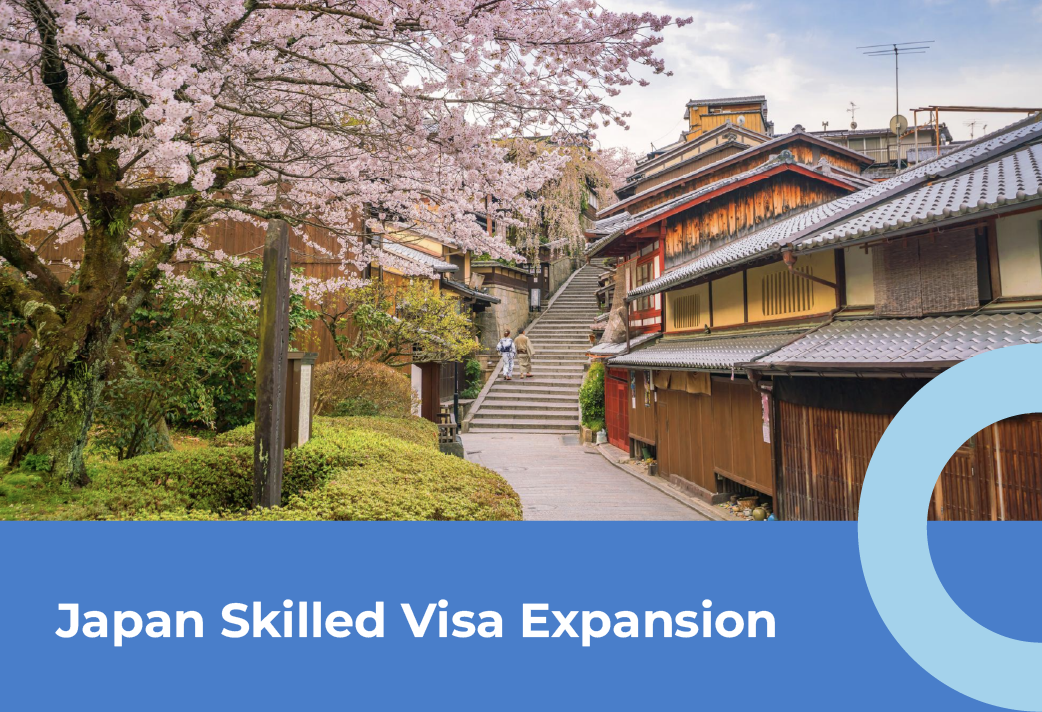With an aging population, Japan is struggling more than others to meet the demand of the local market already facing global shortages. To combat a potentially looming problem, Japan has announced a thorough expansion of its specified skilled visa program for foreign workers in 2024 in an effort to better utilize global talent.
This action not only showcases Japan’s dedication to innovation but also creates new opportunities for qualified workers across the globe. Here, we outline the key points to consider regarding Japan’s extension of the skilled visa program, and go into the ways in which this affects the global talent landscape.
What is the Specialized Skilled Worker Visa?
The status of “Specified Skilled Worker” (SSW) was established to provide foreign nationals with greater employment prospects in Japan. The work visa program offers a way to enter Japan and stay for long periods of time, enjoying the same benefits as local workers.
Type 1 and Type 2 are distinct categories of Specified Skilled Worker Status of Residence providing differing levels of benefits:
Type 1 SSW
This category is intended for those with specific knowledge and expertise in a larger number of fields where there is an acknowledged labor shortage.
A worker with a Type 1 skilled visa can stay in Japan for a maximum of 5 years. This visa is not renewable and does not provide the ability to bring dependents into the country.
Type 2 SSWs
This category was originally intended only for people who have learned certain skills in Japan through on-the-job training.
Because it was envisioned for locally trained workers, the SSW Type 2 visa does not require the same level of qualification as the SSW Type 1 visa and was possible to get much more quickly.
The main differences between SSW Type 1 and Type 2 are the advantages they provide, such as the length of stay in Japan and the ability to bring family members.
Type 2 visa holders are highly prized because they can potentially stay indefinitely.
Historically, getting a type 2 visa has been difficult because of the base requirements involved. Compared to the SSW Type 1 visa, the language and technical skills exams are significantly more difficult.
There is also a notable discrepancy in the number of visa holders because the visa was restricted to workers in a very limited number of industries. According to the Immigration Services Agency of Japan, while there were only a handful of people with Type 2 visas in 2022, those holding Type 1 visas numbered more than 150,000.

Changes to Japan’s Skilled Visa System in 2024
In light of increasing difficulty in addressing labor shortfalls, labor experts in Japan recommended that the SSW Type 2 Visa should be broadened to allow for a large influx of new holders.
As a result, the Japanese government approved the addition of 9 more traditionally “blue collar” industries to those eligible for the Type 2 skilled visa.
These industries are:
– building management
– industrial machinery
– electricity
– electronics and information
– automobile repair and maintenance
– aviation
– accommodation
– agriculture
– fishery and aquaculture
– food and beverage manufacturing
– food service
The government has also committed to streamlining and simplifying the application process and facilitating changes for holders without compromising their eligibility.
Japan hopes to draw in a wide pool of qualified workers by easing the application requirements and expanding eligibility criteria.
Key Highlights of the Skilled Visa Expansion: The Potential Benefits for Applicants
Inclusive Eligibility Criteria
One of the most notable aspects of the expansion is the inclusive approach to eligibility criteria. The program now accommodates a wider range of skills and qualifications, ensuring that professionals from various industries and backgrounds can find opportunities in Japan.
Extended Visa Duration
Professionals seeking to contribute to Japan’s growth will benefit from extended visa durations, potentially being able to stay indefinitely along with their families.
Streamlined Application Process
A streamlined process will not only reduce administrative burdens for applicants but also ensures a quicker and more straightforward path for skilled professionals eager to join the Japanese workforce.
Path to Permanent Residency
The skilled visa expansion emphasizes a smoother transition to permanent residency for skilled workers, making Japan a place to establish roots and contribute to the nation’s long-term development.
Impact on Japan’s Global Competitiveness
By expanding its skilled visa program, Japan aims to avoid demographic challenges and position itself as a magnet for global talent.
How Can Your Company Help You Get the New Japan Skilled Visa? The Application System Outlined
Step 1 – Verify the applicant’s compliance with the prerequisites for a Japan Skilled Labor Visa.
The initial requirements for obtaining a Japan Skilled Labor Visa are based on the applicant’s industry. A key point to remember is that an applicant must always be paid the same amount as a Japanese national for employment of a similar nature.
Once eligibility is assured, the next step is to verify that the planned work in Japan is compliant with the activities allowed for a Japan Skilled Labor Visa holder.
Step 2 – Assemble the documents required to support a Japan Skilled Labor Visa application.
These documents are:
– Application form
– Medical examination report
– Documents related to your pension, health insurance premiums, and taxes
– Documents showing you have passed the relevant test(s)
– Your resume
Step 3 – Submit the application for a Japan Skilled Labor Visa Certificate of Eligibility (“COE”) via a regional immigration office
At this point, you may have to wait around a month under the new streamlined procedures.
Step 4 – Then, apply for a Japanese Residence Card via the Skilled Labor Status of Residence (or “SOR”).
The next stage for an applicant is to swap the Certificate of Employment (COU) for the Skilled Labor Visa for the Skilled Labor “Status of Residence” (often shortened to “SOR”).
This can be completed at an immigration office within Japan or through a Japanese embassy or consulate abroad.
Keep in mind, that this process requires you to have a legal contract of employment with a company in Japan, requiring your employer to either have a legal entity in the country or to work through a qualified Employer of Record (EOR) in Japan.
Possible Further Changes to the Japan Skilled Worker Visa System in 2024
By 2024, the government is apparently planning to introduce an additional “transport driver” SSW skilled visa category for skilled blue-collar workers. This is primarily intended to address the acute lack of drivers for trucks, buses, and taxis.
The Japanese government also laid out a road map for increasing post-graduation employment of international students in Japan, with intentions to extend visa programs to domestic institutions that target the graduates of elite international universities. By 2033, the government wants to see 500,000 foreign students in Japan, and will work to facilitate their entry into the workforce.
Such efforts signal the recognition of the full scale of Japan’s labor problems, meaning further changes can be expected in the coming years.
Can an Employer of Record Provide Me with a Skilled Visa for Japan?
The Role of Employer of Record (EOR) Partners in Simplifying the Skilled Visa Categories for Foreigners in Japan
An Employer of Record can significantly simplify the process of obtaining a skilled visa for Japan by taking on the role off the legal employer of your workers in Japan. This allows the EOR to take care of all the legal procedures required to apply for a visa and get to work.
EORs like INS Global employ teams of legal and business professionals well-versed in local regulatory practices and business practices so that your employees are never in danger of compliance errors. Employing workers in Japan also gets your operations up and running in a fraction of the time it would take to open a local company entity in order to hire employees in-house.
EORs can handle all administrative duties required in Japan including payroll, tax compliance, and benefits administration, facilitating a smooth onboarding process for international employees.
Furthermore, EORs can assist in reducing the long-term legal and compliance risks connected with hiring foreign workers on a SSW skilled visa by providing in-depth knowledge of changing local rules.
INS Global: Ready to Help You Expand to Japan in 2024 and Beyond
The expansion of Japan’s skilled visa program is a significant step toward the country’s goal of becoming a more inventive and globally linked nation. As talented workers from all over the world take advantage of this expansion’s chances, Japan is likely to gain from the knowledge and viewpoints of a more diversified workforce.
INS Global is leading the way in helping businesses grow into Japan and beyond. Our experience and knowledge of local laws make international expansion easier and safer.
We focus on the individual needs of our partners to provide tailored solutions that align with your goals and long-term global vision. Whether you’re a multinational corporation or a growing startup, we have the answers to common and uncommon challenges so you can get to work on global success fearlessly.
As Japan prepares for a new era of global collaboration with it’s skilled visa expansion, INS Global stands ready to be your partner in navigating the complexities of international growth. With a team of experts dedicated to ensuring compliance and success, INS Global is the ally you need for a seamless entry into the Japanese market in 2024 and beyond.
Contact our team of seasoned global expansion advisors today to learn more.

SHARE